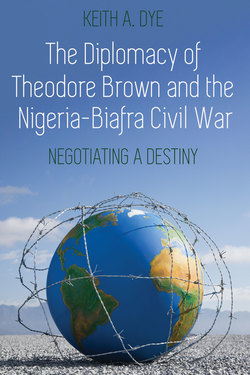The Diplomacy of Theodore Brown and the Nigeria-Biafra Civil War

Реклама. ООО «ЛитРес», ИНН: 7719571260.
Оглавление
Keith A. Dye. The Diplomacy of Theodore Brown and the Nigeria-Biafra Civil War
The Diplomacy of. Theodore Brown and the. Nigeria-Biafra. Civil War. Negotiating a Destiny
Отрывок из книги
Keith A. Dye
PETER LANG New York • Bern • Berlin Brussels • Vienna • Oxford • Warsaw
.....
The chapter recounts select examples of daring European (again mostly British, with a supportive United States) activities that constructed the Atlantic empire, and African and African American resistance (this does not discount African complicity in this early, modified form of colonization). I briefly range back-and-forth between the mid-twentieth century and the beginnings of the slave trade for context, then move chronologically up to Nigerian independence. During this narrative I try to briefly highlight one aspect of the theme of the book: the growing encounters of African Americans with Nigerians, where independence of the latter was an important event for the former, who had matured in their understanding of the breadth of the cross-Atlantic colonial system. A key point is the idea of transition. Nigerians, African Americans, Britons, and Americans were all linked ←14 | 15→in a loosening embrace that accelerated the pace and broadened the parameters of the African American freedom movement.
Formation of the ANLCA, its early interest in the turmoil that beset post-colonial Nigeria, and the role of the United States with both command the narrative of chapter two. Because the book is not a history of the ANLCA but merely of its involvement in the civil war, I have avoided giving depth to their origins. Instead, the chapter chronicles the interplay between ANLCA organizers, the U.S. foreign relations establishment, and Nigerian leaders brought together as a result of the strife. To ensure proper context, the intriguing negotiations between the United States, the Federal Military Government of Nigeria, and Igbo (later Biafran) leaders is presented. The role of the ANLCA surfaces principally through Theodore E. Brown, its executive director. He was the workhorse for the group and the connection between the ANLCA, Nigeria, Biafra, and the United States, a role greatly undervalued in other histories—brief though they are—of any African American interest in the civil discord. Available primary sources place Brown in this dominant role, which the chapter seeks to reconstruct as best as possible. Lastly, chapter two takes readers to the point when the ANLCA petitions for entry into the pre-war stage of the conflict, and ultimately to the point of open warfare.
.....